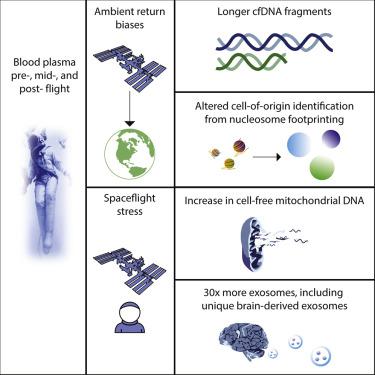iScience ( IF 4.6 ) Pub Date : 2020-11-25 , DOI: 10.1016/j.isci.2020.101844 Daniela Bezdan 1, 2 , Kirill Grigorev 1 , Cem Meydan 1, 3, 4 , Fanny A Pelissier Vatter 5 , Michele Cioffi 5 , Varsha Rao 6 , Matthew MacKay 1 , Kiichi Nakahira 7 , Philip Burnham 8 , Ebrahim Afshinnekoo 1, 3, 4 , Craig Westover 1 , Daniel Butler 1 , Chris Mozsary 1 , Timothy Donahoe 1 , Jonathan Foox 1 , Tejaswini Mishra 6 , Serena Lucotti 5 , Brinda K Rana 9 , Ari M Melnick 10 , Haiying Zhang 11 , Irina Matei 5 , David Kelsen 11 , Kenneth Yu 11 , David C Lyden 5 , Lynn Taylor 12 , Susan M Bailey 12 , Michael P Snyder 6 , Francine E Garrett-Bakelman 10, 13, 14, 15 , Stephan Ossowski 16 , Iwijn De Vlaminck 17 , Christopher E Mason 1, 3, 4, 18

|
Liquid biopsies based on cell-free DNA (cfDNA) or exosomes provide a noninvasive approach to monitor human health and disease, but have not been utilized for astronauts. Here, we profile cfDNA characteristics, including fragment size, cellular deconvolution, and nucleosome positioning, in an astronaut during a year-long mission on the International Space Station (ISS), compared to his identical twin on Earth and healthy donors. We observed a significant increase in the proportion of cell-free mitochondrial DNA (cf-mtDNA) inflight, and analysis of post-flight exosomes in plasma revealed a 30-fold increase in circulating exosomes and patient-specific protein cargo (including brain-derived peptides) after the year-long mission. This longitudinal analysis of astronaut cfDNA during spaceflight and the exosome profiles highlights their utility for astronaut health monitoring, as well as cf-mtDNA levels as a potential biomarker for physiological stress or immune system responses related to microgravity, radiation exposure, and the other unique environmental conditions of spaceflight.
中文翻译:

长达一年的人类太空飞行的游离 DNA (cfDNA) 和外泌体分析揭示了循环生物标志物
基于无细胞 DNA (cfDNA) 或外泌体的液体活检提供了一种非侵入性方法来监测人类健康和疾病,但尚未用于宇航员。在这里,我们分析了一名宇航员在国际空间站 (ISS) 执行为期一年的任务期间的 cfDNA 特征,包括片段大小、细胞解卷积和核小体定位,并与他在地球上的同卵双胞胎和健康捐赠者进行了比较。我们观察到飞行中无细胞线粒体 DNA (cf-mtDNA) 的比例显着增加,对飞行后血浆中外泌体的分析显示,循环外泌体和患者特异性蛋白质货物(包括脑源性蛋白质)增加了 30 倍。肽)经过一年的任务后。对太空飞行期间宇航员 cfDNA 和外泌体概况的纵向分析强调了它们在宇航员健康监测中的实用性,以及 cf-mtDNA 水平作为与微重力、辐射暴露和其他独特环境相关的生理应激或免疫系统反应的潜在生物标志物。太空飞行的条件。











































 京公网安备 11010802027423号
京公网安备 11010802027423号